
Strong assets in Vietnam - Bulgaria relations: Chargé d'affaires
Latest
| TIN LIÊN QUAN | |
| Thousands of people join Bulgarian rose festival in Ha Noi | |
| Deputy PM: Vietnam wants to strengthen ties with Bulgaria | |
 |
| Bulgarian Chargé d'affaires Marinela Petkova. |
Madame Chargé d’affaires, the visit of Deputy Prime Minister and Foreign Minister Pham Binh Minh is the first one made by a Vietnamese Foreign Minister to Bulgaria since 1989. What are your expectations of the outcome of this trip?
Bulgaria has always attached great importance to developing and deepening of the friendly relations with Vietnam as a vital partner in the dynamic region of Southeast Asia. The ties between our two countries are based on goodwill, mutual respect and trust, and they have their rich, almost seven decades of history.
Bulgaria and Vietnam established bilateral relations back in 1950, but most importantly, ever since, we managed to sustain an active dialogue in all fields of cooperation. The exchange at the highest political level has most recently peaked with the visits to Bulgaria of the Vietnamese Vice President (2010 and 2014), the visits to Vietnam of the President (2013), the Vice President (2015) and the Prime Minister of Bulgaria (2014); and the exchange visit of the Prime Minister of Vietnam to Bulgaria (2015).
All the while the sectoral cooperation has been unfolding. The economic cooperation, for instance, has been executed through the work of the Joint Economic Commission that convenes on a regular basis.
Our National Assemblies collaborate closely through the established and well-functioning reciprocal Groups of Friendship. Only this year the Chairwomen of both our National Assemblies held a bilateral meeting within the frameworks of the 138th Assembly of the Inter-Parliamentary Union in Geneva in March; in April, Bulgaria hosted a Parliamentary delegation from Vietnam, led by Vice Chairman Uong Chu Luu.
The cooperation between our local authorities has also been strengthened through numerous Memoranda of Cooperation, the most recent being between the cities of Can Tho and Ruse, the Ho Chi Minh city and Sofia. The coastal cities of Varna and Da Nang also cooperate on cultural, sports, educational and other events. The capitals Sofia and Ha Noi exchanged visits in 2017 and 2018, respectively, to look into concrete projects for urban development - opportunities for green solution for cities, water and waste management, hospital management were outlined.
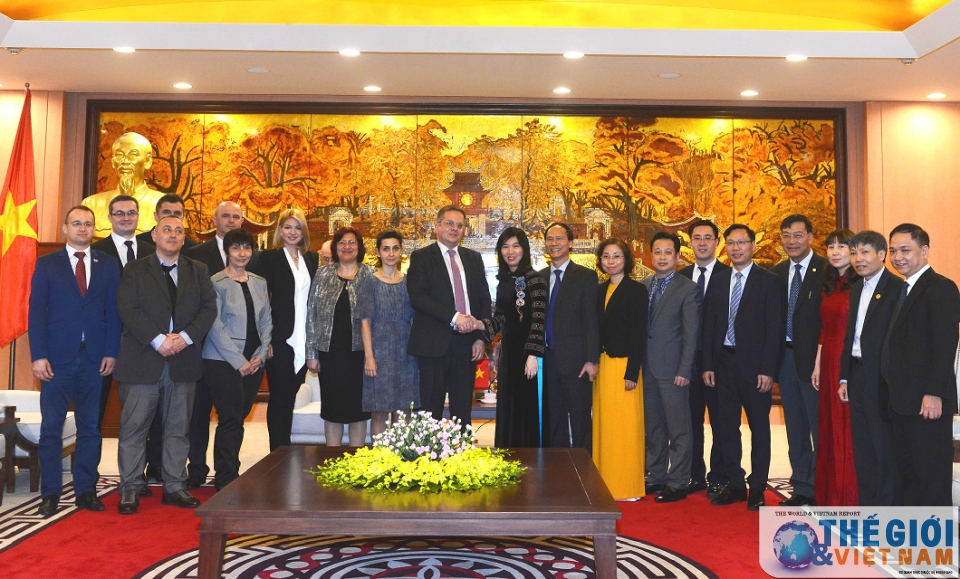 |
| Visit of a delegation from the Sofia Municipality to Ha Noi, March 2018. |
The latter comes at no surprise as Vietnam has an impressive rate of social and economic development and its active, constructive and pragmatic foreign policy positioned the country as a valuable international partner with increasing regional significance.
Now, in just a few days, Bulgaria hosts the Deputy Prime Minister and Minister of Foreign Affairs H.E. Mr. Pham Binh Minh, noting that the last exchanged bilateral visit at the level of Minister of Foreign Affairs between Bulgaria and Vietnam dates back from 2008. The current visit will offer opportunity for an extensive review of our bilateral cooperation, share on our foreign policy tasks and priorities, on global issues of mutual concern, and pave the way towards even closer collaboration on the international scene. I expect substance and candid dialogue as our both Foreign Ministers have maintained regular contacts through their yearly bilateral meetings on the sidelines of the UNGA in September in New York. Mr. Pham Binh Minh and Bulgaria’s Deputy Prime Minister and Minister of Foreign Affairs Ms. Ekaterina Zaharieva lastly held talks in 2017.
Bulgaria is an ideal destination for education for Vietnamese people in many professions. According to incomplete statistics, about 4,000 Vietnamese have studied in Bulgaria, then returned to Vietnam to serve our country. What do you think about the educational cooperation between the two countries?
Education is a strong asset for the future that Bulgaria and Vietnam share a strong foundation for. Indeed, the resilience of Bulgaria and Vietnam’s bilateral relationship comes from many of the thousands of Vietnamese people who once had the opportunity to live and study in Bulgaria. About 4,000 is just the number of those who received their higher education in Bulgaria, thousands more received vocational training in various industrial fields.
Bulgaria has proudly witnessed as many of its Vietnamese graduates returned to Vietnam to made a name of themselves, contributing their distinguished careers as Government officials, doctors, teachers, etc. The vibrant Vietnam-Bulgaria Friendship Associations in the cities of Ha Noi, Ho Chi Minh and Hai Phong are the core of this community.
When I first came to Vietnam I was astound to find myself in a country so far away from Bulgaria, and yet so deeply connected with us, to find myself among friends. Two of my first official functions, just days after I had arrived in Vietnam, were an anniversary gathering of the graduates of the Varna University of Economics and I left humbled by the love and appreciation they had for my country; the other was the celebration of the Day of the Bulgarian education, culture and the Slavonic Alphabet, which is a signature event of the Bulgarian Embassy in Ha Noi, when every year we bring together Bulgarian alumni in Vietnam. This year we were happy to also have in attendance the Vice President H.E. Nguyen Thi Doan (2007-2016), who had completed her doctoral degree in Bulgaria.
One of the true symbols of the collaboration between Bulgaria and Vietnam in the filed education is Viet-Bun Kindergarten in Ha Noi, which was built in 1981 with Bulgaria’s support. Nowadays, the Bulgarian Embassy in Ha Noi works closely with the Kindergarten – which I can assure you, is one of the most gratifying experiences during my tenure in Vietnam. In 2016 and 2017 the Kindergarten was beneficiary to two development projects of the Ministry of Foreign Affairs of Bulgaria.
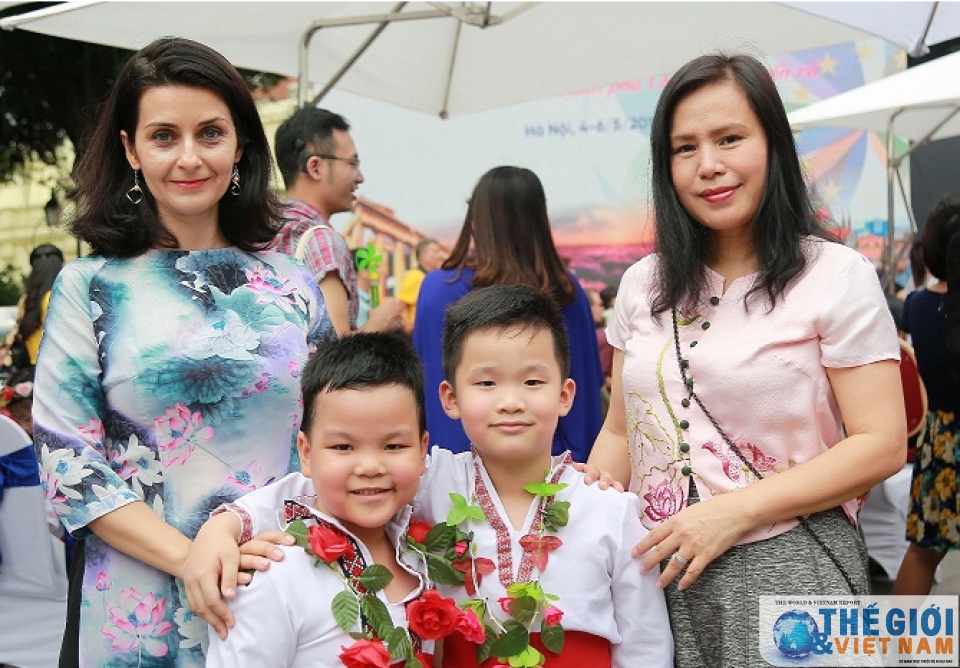 |
| Ms. Petkova and Director of Viet - Bun Kindergarten Bui Thi Kim Xuan. |
To build a strong partnership in the long run, Bulgaria and Vietnam must pursue an ambitious agenda for fostering people-to-people relations, cultural and educational exchange, as these are the alternative engines of growth in partnership and development.
Today, the Ministry of Education and Science of Bulgaria and the Ministry of Education and Training of Vietnam have a standing agreement for exchange in the field of education, offering state scholarships to gifted students and researchers. The Bulgarian Embassy in Ha Noi is an excited witness of a new and growing number of Vietnamese students, who entrust Bulgarian Universities with their higher and continuing education. Some of the institutions of choice are the: Sofia University “St. Kliment Ohridski“; New Bulgarian University; University of National and World Economy in Sofia; the Medical Universities of Sofia and Plovdiv; as well as Ruse University “Angel Kantchev“; University of Architecture, Civil Engineering and Geodesy; University of Mining and Geology “St. Ivan Rilski“ - sought after for their advanced engineering degrees.
Some of the above, along with a few other higher education institutions like the University of Chemical Technology and Metallurgy, the Varna University of Management, and Blagoevgrad University are in direct collaboration with partners in Vietnam to provide programs for academic mobility and education. One such very good instrument is the EU ERASMUS + Program, which is the primary vehicle for a short term academic mobility.
The leadership of a few Bulgarian universities have visited with Vietnamese partners in the course of the last few years to develop direct linkages of communication.
Bulgaria provides excellent competitive value for Vietnamese students and researchers with regard to tuition fees and cost of living, but also when it comes to other important factors such as political stability, inclusive society and strong historic ties. Bulgaria’s membership into the European Union is another unique advantage, offering to the inquisitive and young people of Vietnam possibilities for travel and immense cultural exposure.
For a few consecutive years now the Bulgarian Embassy in Ha Noi, along with the Delegation of the EU and the other EU members states’ Embassies in Ha Noi organizes a “Study in Europe” fair, where programs designed to cater to the needs of foreign students are presented. This year’s event will take place in the cities of Ha Noi, Ho Chi Minh and Da Nang in mid September.
Cultural cooperation between Vietnam and Bulgaria is also developing with many bilateral cultural cooperation programs, most notably the “Bulgarian Rose Festival” held in March every year. In your opinion, how can our two countries promote this area of cooperation?
Your observation is right. The cultural cooperation between Bulgaria and Vietnam is also growing. Both countries pride themselves with millennials old history, overcoming adversaries to preserve unique artefacts and traditions. With Vietnam and Bulgaria opening towards one another, Bulgarian people came to learn more of Vietnam, discovering its world heritage sites, traditional performing and visual arts, its customs, family values, enjoying the famous Vietnamese hospitality.
 |
| Chargé d'affaires Marinela Petkova speaks at the Bulgarian Rose Festival Opening, March 2018. |
The bilateral cultural cooperation is executed through five-year official program for cooperation, but, increasingly so, by initiatives of local authorities and various cultural organizations.
The Bulgarian Rose Festival that takes place in March, in Ha Noi, with the support of the Ministry of Culture, Sports and Tourism of Vietnam and Ha Noi People’s Committee, allows for the showcase of Bulgaria’s tradition for rose cultivation and oil distillation, but also helps encourage future concrete business and economic interactions. It is held in celebration of spring and the friendly ties between Bulgaria and Vietnam – we say, as flowers are symbolic of friendship and peace, such are the relations between Bulgaria and Vietnam.
The Vietnam-EU Free Trade Agreement (EVFTA) may be signed and ratified by the end of this year. This is a major opportunity for the two countries to furthermore develop the diplomatic relations in the future. Could you share with us the interest and participation of Bulgaria in this agreement and your own expectations of the EVFTA after it will be officially ratified?
On January 1st, 2018, Bulgaria assumed its first ever Presidency of the Council of the European Union – a six-month period at the helm of the European Union, when Bulgaria has an opportunity to accelerate joint efforts in certain areas of importance. Indeed, the present opportunities in the Vietnam-Bulgaria bilateral relations are closely intertwined with Viet Nam’s membership in ASEAN and Bulgaria’s membership in the EU, as the two organizations offer another exciting measure of untapped political and economic potential. We look forward to Vietnam chairmanship of ASEAN in 2020, as the EU and ASEAN commenced on the way to an all-encompassing strategic partnership.
The EU-Vietnam Free Trade Agreement, negotiated in 2015, will connect the fast growing economy of Vietnam with one of the largest and most open economies in the world; will offer more opportunities for investment, joint connectivity, energy, science and technology projects, for sustainable solutions to support Vietnam’s impressive growth rate.
The EVFTA is a most ambitious and comprehensive FTA, second for the EU in the ASEAN region after Singapore, and as such bears also a substantial regional political leverage. Furthermore, the EU-Vietnam Framework Agreement on Comprehensive Partnership and Cooperation, which entered into force in October 2016, has the potential to carry the relationship beyond the boundaries of the trade and economic cooperation, into an outward-looking, advanced, multifaceted cooperation for the benefit of our both peoples.
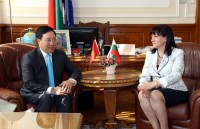 | Deputy PM Pham Binh Minh enhances cooperation with Bulgaria Deputy Prime Minister and Foreign Minister Pham Binh Minh has called on the Bulgarian National Assembly (NA) to support the Governments of Vietnam and Bulgaria ... |
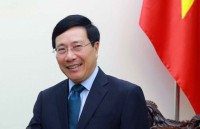 | Ambassador expects stronger Vietnam-Bulgaria relations Vietnamese Ambassador to Bulgaria Nguyen Thi Hong Oanh has voiced expectations for stronger ties with Bulgaria ahead of an official visit to the European nation ... |
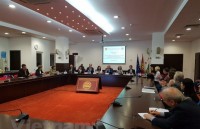 | Bulgaria backs early signing of EU-Vietnam FTA As holding the presidency of the Council of the European Union (EU), Bulgaria advocates the early signing and approval of the EU – Vietnam Free ... |

















